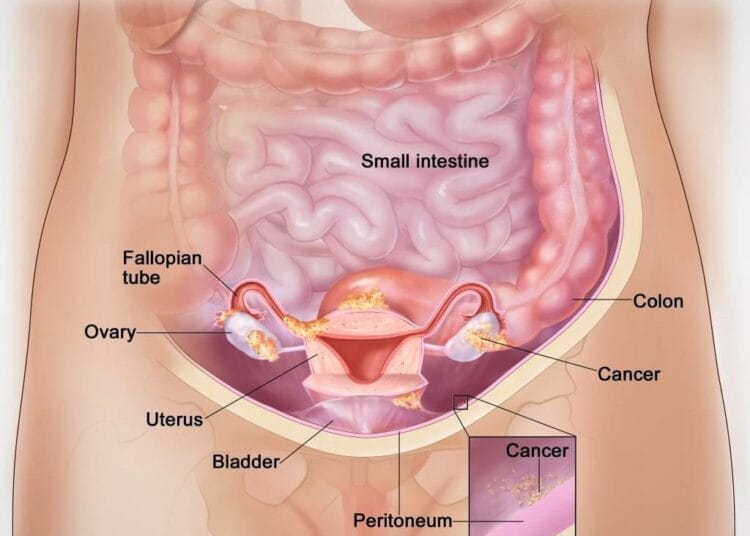Ovarian cancer is one of the most serious cancers affecting women, often due to its late detection, which contributes to its high mortality rate. This type of cancer predominantly affects women between the ages of 40 and 65, and it ranks as the seventh most common cancer in women worldwide. In 2020, there were 313,959 new cases of ovarian cancer globally, resulting in 200,700 deaths. Early detection is crucial for better outcomes, making awareness, regular screenings, and timely medical intervention key in improving survival rates.
Ovarian Cancer Symptoms
Symptoms of ovarian cancer can often be vague and may be mistaken for other common conditions. Some signs to watch out for include:
- Abdominal swelling or bloating
- Persistent abdominal discomfort or pain
- Feeling full quickly or difficulty eating
- Frequent or urgent need to urinate
In the early stages, ovarian cancer often does not produce noticeable symptoms, which is why it is commonly diagnosed only in later stages. It’s important for women to be proactive with regular health check-ups, as early detection can greatly improve treatment success rates.
Risk Factors for Ovarian Cancer
Several risk factors can increase a woman’s chances of developing ovarian cancer. These include:
- Being of Caucasian descent
- Not having been pregnant
- Early onset of menstruation or late menopause
- A family history of ovarian, breast, or endometrial cancers, particularly if related to inherited BRCA1 or BRCA2 mutations
- Having Lynch syndrome (hereditary nonpolyposis colorectal cancer), which also increases the risk of ovarian and endometrial cancers
How Is Ovarian Cancer Diagnosed?
To diagnose ovarian cancer, healthcare providers may use a combination of the following tests:
- Imaging Tests: Ultrasounds, CT scans, or MRIs help visualize abnormal growths in the ovaries. While these imaging tests provide important information about the location and size of possible tumors, they cannot definitively diagnose ovarian cancer.
- Blood Test for Tumor Markers (CA 125): This test measures the level of CA 125, a protein found in elevated amounts in many women with advanced ovarian cancer. However, CA 125 levels can also be elevated due to benign conditions, so this test is not conclusive on its own.
- Surgery: A diagnostic surgery remains the most reliable method for confirming ovarian cancer. During surgery, a pathologist examines ovarian tissue samples to check for cancerous cells. If cancer is confirmed, the surgeon may proceed with debulking surgery, which involves removing as much of the tumor as possible. In many cases, this includes a total hysterectomy with salpingo-oophorectomy, which removes the uterus, ovaries, and fallopian tubes.
Ovarian Cancer Staging
Cancer staging refers to determining how far the cancer has spread in the body. This process helps doctors decide on the most effective treatment approach and predict the patient’s prognosis. Staging is classified from I to IV, with higher stages indicating more widespread disease. Each stage is further divided into categories A, B, and C to describe the extent of tumor involvement.
Early-Stage Cancer
- Stage IA and IB: Cancer is confined to one or both ovaries without rupture of the ovarian capsule.
- Stage IC: In stage IC, the cancer has spread within the pelvis or the ovarian capsule has ruptured.
- Stage II: The cancer has spread beyond the ovaries to nearby pelvic organs, such as the uterus or fallopian tubes.
Advanced-Stage Disease
- Stage III: Cancer has spread to the abdomen and surrounding lymph nodes.
- Stage IV: Cancer has metastasized to distant organs, such as the liver or lungs.
Accurate staging is crucial for devising the most appropriate treatment plan and assessing long-term prognosis.
Ovarian Cancer Treatment
Treatment for ovarian cancer generally begins with surgery to remove the tumor. The next steps depend on the cancer’s stage, the woman’s age, and other medical factors. In some cases, no further treatment is needed, while others may require chemotherapy. Chemotherapy is a type of treatment that uses drugs to target and kill cancer cells.
Fertility Considerations: Women who wish to preserve fertility should discuss this with their healthcare provider before starting treatment. Ovarian cancer treatments, particularly surgery, often result in infertility. However, in select cases, it may be possible to explore fertility-preserving options, depending on the nature and stage of the cancer.
Post-Treatment Monitoring: After treatment, regular follow-up visits are necessary to monitor for any signs of cancer recurrence. Follow-up care may involve physical exams, blood tests, and imaging studies. It’s essential for patients to stay vigilant and report any symptoms that may indicate the return of cancer.
Ovarian Cysts vs. Ovarian Cancer
Ovarian cysts and ovarian cancer are distinct conditions, though they may share some overlapping symptoms. Ovarian cysts are fluid-filled sacs that often form during a woman’s menstrual cycle and usually resolve on their own. In contrast, ovarian tumors are solid masses composed of abnormal cells and typically require medical intervention.
While most ovarian cysts are harmless, complex cysts can occasionally increase the risk of cancer, especially in older women. Understanding the differences between cysts and tumors is essential, and consulting a doctor is advised if symptoms arise. If concerns about a diagnosis remain unresolved, seeking a second opinion can provide clarity and peace of mind.
What Else Should I Do?
Following your doctor’s advice regarding follow-up visits and tests is essential for effective treatment and monitoring. Open communication with your healthcare team about side effects, challenges, or concerns is equally important. When considering new treatments, it’s helpful to ask questions such as:
- What are the benefits of this treatment?
- Will this treatment extend my life or improve my quality of life?
- What are the potential side effects or downsides?
- Are there alternative treatments available?
- What happens if I decide against this treatment?
These discussions will help you make informed decisions about your care and ensure that your treatment plan aligns with your personal values and goals.
Frequently Asked Questions (FAQs)
Can Ovarian Cancer Be Prevented?
While there is no guaranteed way to prevent ovarian cancer, there are steps that may help reduce the risk. If ovarian or breast cancer runs in your family, genetic testing and counseling may help identify if you are at higher risk. For some women, prophylactic surgery to remove the ovaries and fallopian tubes can reduce the risk.
What Is the Survival Rate for Ovarian Cancer?
The survival rate for ovarian cancer varies depending on the stage at diagnosis. If caught early, the survival rate is much higher, but many women are diagnosed in later stages when the cancer has already spread. It’s important for women to stay informed about their risk factors and discuss any concerning symptoms with their doctor promptly.
What Is the Difference Between Ovarian Cysts and Ovarian Cancer?
Ovarian cysts are fluid-filled sacs that can form on the ovaries and are common, especially during reproductive years. Most ovarian cysts are benign and do not indicate cancer. However, some complex cysts may require monitoring, as they can be associated with an increased risk of ovarian cancer, particularly in postmenopausal women. If you experience symptoms like abdominal bloating or pain, it’s essential to consult a doctor for further evaluation.
How Is Ovarian Cancer Treated?
Ovarian cancer treatment usually involves surgery to remove the cancerous tissue. Depending on the stage of cancer, chemotherapy or targeted therapies may be recommended. The choice of treatment depends on various factors, including the extent of the disease, the patient’s overall health, and the desire for fertility preservation.
What If I Want to Get Pregnant in the Future?
For women hoping to conceive after treatment, it’s important to communicate this desire with your doctor beforehand. While ovarian cancer treatment often affects fertility, certain treatment plans may allow for the possibility of preserving reproductive capabilities. Your doctor can help you explore fertility-preservation options tailored to your situation.
What Happens After Treatment?
After completing ovarian cancer treatment, regular follow-up care is crucial. These check-ups typically include:
- Blood Tests: To monitor levels of tumor markers like CA 125, which can indicate cancer recurrence.
- Physical Examinations: To assess overall health and detect any abnormalities.
- Imaging Studies: Such as ultrasounds, CT scans, or MRIs, to visualize any potential tumor growth.
Being vigilant about recurring symptoms is critical. Report any changes in your health to your doctor promptly, as early detection of recurrence can lead to more effective management.
What Happens If the Cancer Comes Back or Spreads?
If ovarian cancer recurs or spreads to other parts of the body, treatment options may include additional surgery, chemotherapy, or targeted therapies. Targeted therapies are specialized drugs designed to block the growth and spread of cancer cells while minimizing harm to healthy tissues. Your doctor will guide you through the best course of action based on the specifics of the recurrence.
Can Ovarian Cancer Be Prevented?
While there is no guaranteed way to prevent ovarian cancer, individuals with a family history of ovarian or breast cancer are encouraged to consult their doctor. Preventive measures may include genetic testing for BRCA mutations, lifestyle changes, or, in high-risk cases, preventive surgery. Early discussions with a healthcare provider can help identify personalized strategies to reduce risk.
Conclusion
Ovarian cancer is a serious disease that requires early detection for effective treatment. Women should be aware of the symptoms, risk factors, and available diagnostic tools. Regular check-ups, genetic testing for high-risk individuals, and discussions with healthcare providers about potential treatment options can improve outcomes and survival rates. Awareness, education, and timely intervention are critical in the fight against ovarian cancer.






























